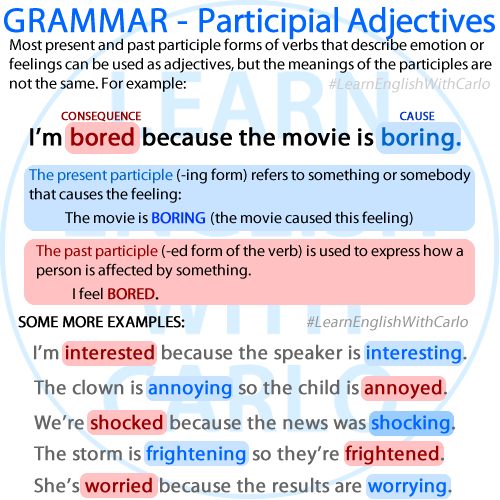The Difference Between -ed and -ing Forms
In English, many verbs that describe emotions or feelings can be transformed into adjectives by using their present or past participle forms. However, it’s important to note that these two forms convey different meanings. Let’s explore how to use these participial adjectives correctly.

Present Participle (-ing Form)
The present participle form of a verb (ending in -ing) is used to describe something or someone that causes a particular feeling. It tells us what effect something has on others.
Example:
- The movie is boring.
(The movie causes people to feel bored.)
Past Participle (-ed Form)
The past participle form of a verb (usually ending in -ed) is used to describe how a person feels as a result of something. It reflects the emotion that is experienced.
Example:
- I feel bored.
(I am affected by the boring movie.)
More Examples:
- I’m interested because the speaker is interesting.
(The speaker causes interest, and I feel interested.) - He’s annoyed because the child is annoying.
(The child causes annoyance, and he feels annoyed.) - We’re shocked because the news was shocking.
(The news caused shock, and we feel shocked.) - The storm is frightening, so they’re frightened.
(The storm causes fear, and they feel frightened.) - She’s worried because the results are worrying.
(The results cause worry, and she feels worried.)
Important Note:
You cannot use the past participle (-ed form) with things because things do not have emotions. The past participle form is only used to describe how people (or sometimes animals) feel.
Common Verbs Used as Participial Adjectives:
Here’s a list of verbs that are commonly used as participial adjectives. Each verb can be turned into both -ing and -ed forms, depending on the context:
- amaze
- amuse
- annoy
- calm
- confuse
- disgust
- distract
- disturb
- embarrass
- encourage
- entertain
- fascinate
- frighten
- frustrate
- infuriate
- insult
- please
- refresh
- relax
- sicken
- stimulate
- surprise
- terrify
- thrill
- worry
How about a Practice Exercise:
